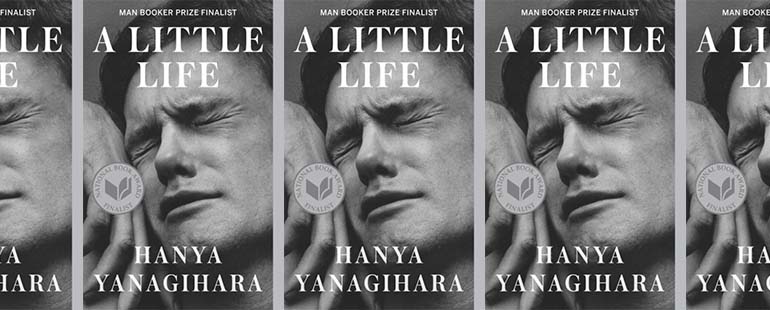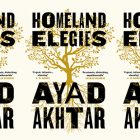The Fanfiction of A Little Life

When I’m asked for book recommendations, I will not, cannot recommend A Little Life. This is not because I hate it. In fact, I stand firmly—and defensively—in the camp of people who have nothing but unflagging devotion for Hanya Yanagihara’s 720-page masterpiece about the lives of four men bound together by friendship and love. It’s a book I love carefully, perhaps even protectively, guarding its contents from criticism with a fervor I can only describe as “devout.” It’s the book I wish I’d written, so pure is it in its dedication to the emotions of life. The first time I read it, I wept uncontrollably through the entire thing, my husband coming home to find me inconsolable and sobbing on the couch. “Why are you doing this to yourself?” he’d ask. “Because it’s beautiful,” I’d reply.
He’s one of only two people I’ve ever told to read it, and when he finished the final pages, he told me he teared up a little, that it got him, too. But, he explained, he was also frustrated with Yanagihara. He felt manipulated, tricked into an emotional ache that didn’t let up for the entirety of the novel. I remember feeling confused by his confession, maybe even a little angered. To me, A Little Life was relentless, but never once did I feel cajoled into an unwelcome melancholy. Instead, I always felt fully aware of Yanagihara’s commitment to sorrow—if that’s what you want to call it—and instead often felt propelled by the book’s tragedies, and equally buoyed by its triumphs.
Reading reviews of the book, I realized I wasn’t alone in my seemingly masochistic enjoyment of the book’s trauma. But there are also those who share my husband’s opinion, hating the book for what it put them through emotionally. I struggled to find an explanation for why I had loved this aspect of the novel, felt I understood it even, when so many others hadn’t felt the same. Then, one day, I found myself saying, “It’s like reading fanfiction! It’s supposed to be over the top!” Suddenly, the book and my dedication to it began to make sense.
For the uninitiated, fanfiction is a genre of writing wherein fans of a particular franchise take their favorite characters and write them new stories. Usually each story, or “fic” as they are often called, deals with particular romances or “pairings” between the source material’s characters. For example, if you’re reading fanfiction based on The Beatles, perhaps your favorite pairing is John and Yoko, and so the stories you seek out revolve around them. Oftentimes though, pairings can be unconventional, or not canon—like, for example, a romance between John and George. Nothing in Beatles history has ever suggested that such a romance existed, but in the world of fanfiction, anything is fair game. It’s a way for fans to continue their favorite stories, and also a way to alter a story so it reflects your own desires and interpretations.
Fanfiction can be many things. Oftentimes it’s sexual and erotic, giving fans an opportunity to imagine their favorite pairings in romantic situations that are often left out of the actual source material. Other times it can be deeply sorrowful and traumatic. This genre of fanfiction is typically referred to as “hurt/comfort.” It’s the genre that A Little Life would most easily fall into, and it can often be defined as stories in which the main character is consistently, even relentlessly, subjected to horrific life experiences, only for other characters to come in and comfort or save them from their misery in the end. It’s a genre of fic built around balance—each tragedy is often met with an equal measure of joy so the story feels rewarding and hopeful despite the pain.
When I think about hurt/comfort fics, I must acknowledge my own predilection towards catharsis. This, after all, seems to be the driving engine for a fic revolving around trauma. In some ways, hurt/comfort seems to suggest that one must experience the lowest of lows before they can appreciate the highest of highs. While I’m not sure if this is the best way to live, it is an interesting exercise to take part in, and often why I’m so drawn to this genre in the first place. To write a hurt/comfort fic, one must be willing to make their main character suffer. To read a hurt/comfort fic, one must be willing to endure that suffering in order to feel the reward of the fic’s uplifting end.
Many people find themselves turning away from this genre of fic because they find it to be too painful, but this idea of pain before pleasure is often reflected in society’s most celebrated fairytales. Cinderella is an abused stepdaughter before she meets the prince who saves her from a life of depravity and wretchedness. Hansel and Gretel are abandoned and left to die in the woods and then nearly eaten before they save themselves from a hungry witch’s fiery oven. Belle endures imprisonment and separation from her ailing father before she can find love with the Beast. When I look at these popular fairytales with their proposed morals and lessons that we, as a culture, continue to pass down to our children, it seems clear to me that the basic concept of hurt/comfort is present in all of them. They make us feel bad so that we can, once again, feel good.
Yanagihara has said many times that she wanted A Little Life to feel like a fairytale, and it’s easy to see this idea reflected throughout her book. The novel tells the story of Jude St. Francis, Malcolm Irvine, Willem Ragnarsson, and JB Marion. Each of these four men is blessed with successful careers—Jude is a high-profile litigator, Malcolm a famous architect, Willem a famous movie star, and JB an art world prodigy—that afford them all the luxuries that money can buy. Monetarily, they never want for anything, making it easy for Yanagihara to honor them with lavish trips and beautiful New York apartments. If you define a fairytale as a “dream come true,” then A Little Life provides its main characters with the sort of dream fulfillment so often touted in American culture.
But a fairytale mustn’t be without its tragedy, and Yanagihara makes sure to balance her main characters’ successes with hardship. JB is plagued by a drug addiction and a deeply narcissistic personality, both of which often affect his relationships in negative ways. Malcolm, though fortunate enough to be born into wealth, is consistently riddled with such indecision and ennui that any true happiness he might ever achieve is basically canceled out. Willem’s history is filled with cold, unloving parents and the tragic death of his intellectually disabled brother, Hemming. But Jude, beautiful Jude, is the true sufferer of A Little Life; his is the sorrow around which all the other’s revolve. His suffering—filled with chronic physical and mental abuse, self-harm, suicidal ideation, severe medical issues, kidnapping, and eventually death—is, however, the very thing that elevates the novel into the realm of a hurt/comfort fairytale fic. As painful as it is to read about Jude’s life, readers are also met with great moments of tenderness and care lavished upon Jude by those who truly love him.
I first began reading fanfiction in high school, and like so many fanfiction readers, most of my reading was done in secret. Only a handful of my friends were privy to the knowledge that I loved reading about the possible (more like definite) romance between Remus Lupin and Sirius Black. I had other favorite pairings, too, and as the years went on and my tastes changed, so did the pairings that I shipped. Even now, if I’m unsatisfied with a particular character’s story, I find myself scouring the popular fanfiction website Archive of Our Own—a site that Yanagihara herself has often been suspected of frequenting—looking for a fix to their story. But fanfiction is more than just a way to get the endings you want, and for many people—especially the LGBTQIA+ community—it’s a way to explore the emotional self through the characters you love.
So often fanfiction is met with apprehension. It’s typically considered the absolute lowest of lowbrow writing. If you happen to write it, you are most likely a “bad writer.” But I’m here to tell you that some of the most exquisite writing I’ve ever read has come in the form of meticulously written, carefully devised fics. Yes, there is always going to be someone publishing stories that are poorly constructed, but for every bad fic, there is also one waiting to blow you away with its depth of knowledge and emotional expanse. And in the end, fanfiction is all about emotion. It pushes us towards that part of ourselves that longs to experience a range of feelings on a visceral level.
It’s true that all literature does this pushing. But fanfiction doesn’t hold back in its execution in the same way that literary fiction often can. Fanfiction pummels its readers with emotion, nearly overdosing us on joy, love, sex, and sorrow until we are left feeling exposed, a raw nerve that jumps at the slightest graze. It’s this rawness that fanfiction readers crave, and it’s this same rawness that Yanagihara brings to the literary world with A Little Life.
Yanagihara’s 2015 novel was shortlisted for the Man Booker prize that year. It’s often assumed that the books shortlisted for the Booker are the best of the best, and I always feel a jolt of pride when I think about how A Little Life—a book so deeply rooted in the emotional realm of fanfiction—made that list. It brings the underground realm of hurt/comfort fics into the literary conversation in a way that seems to make a case for the fanfiction genre as a whole. If we cannot honor stories that ask a lot of us emotionally, it argues, then where are we to go as human beings? Because what is life but a constant series of emotional exchanges that startle us into ourselves every day?
A Little Life does diverge from the hurt/comfort fanfiction model with its ending. Typically, fics end on high notes, with all the characters getting what they most desire or deserve. But Yanagihara rejects that premise in favor of a tragic ending: Jude doesn’t make it out alive. Maybe, though, this is Yanagihara’s way of pushing the genre forward. The book often talks about the “axiom of equality,” in which x must always equal x. Perhaps by rejecting the perfect fanfiction ending, Yanagihara is allowing x to break free from itself and its habits and instead equal a new, beautiful, emotionally devastating y.
Fanfiction readers are often associated with feelings of shame. At one point or another, we didn’t want others to know what we were looking at or writing late into the night. Maybe this is because we could sense that fanfiction’s emotional landscape would be brutally judged by mindsets that value strength in the form of emotional absence. My hesitancy to recommend A Little Life is based in the very same shame that used to keep me from admitting just how much I love fanfiction, and each time I want to suggest the book to someone, I find myself wondering if the person in question can handle it, so scared am I that they’ll hate it. But perhaps this is the wrong approach. Maybe instead I should recommend it with the same abandon with which I read it: emotional and frantic, with one hand over my heart for Jude, that lost cause, that fairytale prince.



